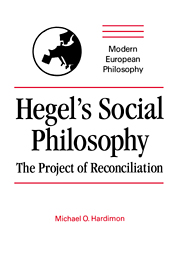Book contents
- Frontmatter
- Contents
- Acknowledgments
- List of abbreviations
- Introduction
- Part I An approach to Hegel's project
- Part II The project of reconciliation
- 4 The anatomy of the project
- 5 Individuality and social membership
- 6 The family, civil society, and the state
- 7 Divorce, war, and poverty
- Conclusion
- Selected bibliography
- Index
7 - Divorce, war, and poverty
Published online by Cambridge University Press: 10 December 2009
- Frontmatter
- Contents
- Acknowledgments
- List of abbreviations
- Introduction
- Part I An approach to Hegel's project
- Part II The project of reconciliation
- 4 The anatomy of the project
- 5 Individuality and social membership
- 6 The family, civil society, and the state
- 7 Divorce, war, and poverty
- Conclusion
- Selected bibliography
- Index
Summary
In this chapter, I discuss those features of the modern social world that, from a Hegelian perspective, are especially problematic: divorce, war, and poverty. My aim is to consider why, in his view, these problems do not undermine the modern social world's claim to be a home. I address these problems in what, from the stand-point of reconciliation, might be considered the order of increasing seriousness. Thus, I begin with divorce, turn to war, and finally consider poverty.
Divorce
Marriage is haunted by the possibility of divorce. The disappointment associated with the fact that marriages can and do collapse may cast doubt upon the institution itself. How could we accept an institution so fraught with risk? How could we accept an arrangement that is so fragile? Nor are the hopes and expectations that are frustrated by divorce merely subjective (merely private, personal, or psychological). They are generated by the nature of the institution. Marriage itself offers the promise of permanence. That is what Hegel means when he says that marriage “ought to be indissoluble” (PR, §176Z; VPRHO, 555) and maintains that it “should be regarded as indissoluble in itself” (PR, §163Z; VPRHO, 519). Why then doesn't the possibility of divorce violate the institution's own promise of permanence? Why doesn't it show that the institution is deeply defective?
Hegel responds to this concern by looking into the nature of the institution. Marriage, he says, is essentially (although not exclusively) an affective unity (PR, §176,Z; VPRHO, 554).
- Type
- Chapter
- Information
- Hegel's Social PhilosophyThe Project of Reconciliation, pp. 228 - 250Publisher: Cambridge University PressPrint publication year: 1994

